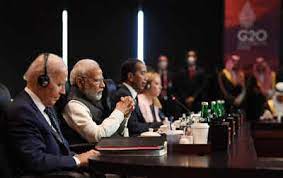BALI, Nov 14: Prime Minister Narendra Modi on Tuesday called for a return to the path of “ceasefire and diplomacy” to resolve the raging Ukraine conflict, and opposed any restrictions on the supply of energy, amid the West’s call against procurement of discounted Russian oil and gas.
In an address at the G-20 summit here, Modi said that climate change, the Covid-19 pandemic, the developments in Ukraine and the global problems associated with it have caused havoc in the world and rued that the global supply chains are in “ruins”.
Referring to India’s upcoming G-20 presidency, Modi said he was confident when the leaders of the grouping meet in the “holy land of Buddha and Gandhi, we will all agree to convey a strong message of peace to the world.”
Speaking at the session on food and energy security, the prime minister highlighted the implications of global problems and said there is a crisis of essentials and essential goods all over the world and that the challenge for the poor citizens of every country is “more severe” today.
Modi also noted that India’s energy-security is also important for global growth as it is the “world’s fastest growing economy”.
“We must not promote any restrictions on the supply of energy and stability in the energy market should be ensured,” Modi said at the session on food and energy security,” the prime minister said in presence of top G-20 leaders including US President Joe Biden and UK Prime Minister Rishi Sunak. Russian foreign minister Sergey Lavrov also attended the summit representing President Vladimir Putin.
The prime minister’s call for not putting any restrictions on energy supplies came amid the West’s call against procurement of Russian oil and gas in view of Moscow’s invasion of Ukraine. India has been procuring discounted Russian crude oil.
He said India is committed to clean energy and the environment.
“By 2030, half of our electricity will be generated from renewable sources. Time-bound and affordable finance and sustainable supply of technology to developing countries is essential for inclusive energy transition,” he added at the summit being held in this Indonesian city.
On the Ukraine conflict, he referred to his repeated call for resolving the crisis through talks.
“I have repeatedly said that we have to find a way to return to the path of ceasefire and diplomacy in Ukraine. Over the past century, the Second World War wreaked havoc in the world,” he said.
“After that, the leaders of that time made a serious effort to take the path of peace. Now it’s our turn. The onus of creating a new world order for the post-Covid period lies on our shoulders,” he noted.
The prime minister said the need of the hour is to show “concrete and collective resolve” to ensure peace, harmony and security in the world.
“I am confident that next year when the G20 meets in the holy land of Buddha and Gandhi, we will all agree to convey a strong message of peace to the world,” he said.
Modi said India will work for global consensus on all key issues during its presidency.
The prime minister also complimented Indonesia for its leadership of G20 in a challenging global environment.
“Climate change, the Covid pandemic, the developments in Ukraine, and the global problems associated with it. All these together have caused havoc in the world. Global supply chains are in ruins,” Modi said.
“There is a crisis of essentials, essential goods all over the world. The challenge for the poor citizens of every country is more severe. Everyday life was already a struggle for them,” he said.
The prime minister said the poor do not have the financial capacity to deal with the “double whammy”
“Due to the double whammy, they lack the financial capacity to handle it. We should also not hesitate to acknowledge that multilateral institutions such as the UN have been unsuccessful on these issues,” he said.
“And we have all failed to make suitable reforms in them. Therefore, today the world has greater expectations from the G-20, the relevance of our group has become more significant,” he added.
The prime minister also highlighted India’s efforts to ensure food security during the pandemic.
“During the pandemic, India ensured food security of its 1.3 billion citizens. At the same time, food grains were also supplied to many countries in need. The current shortage of fertilizers in terms of food security is also a huge crisis,” he said.
“Today’s fertilizer shortage is tomorrow’s food crisis, for which the world will not have a solution. We should build mutual agreement to maintain the supply chain of both manure and food grains stable and assured,” Modi said.
The prime minister said India is promoting natural farming, and re-popularising nutritious and traditional foodgrains like millets for sustainable food security.
“Millets can also solve global malnutrition and hunger. We all must celebrate the International Year of Millets with great enthusiasm next year,” he said.
The G20 comprises 19 countries: Argentina, Australia, Brazil, Canada, China, France, Germany, India, Indonesia, Italy, Japan, South Korea, Mexico, Russia, Saudi Arabia, South Africa, Turkey, the UK, the USA and the European Union (EU). (PTI)
Trending Now
E-Paper


